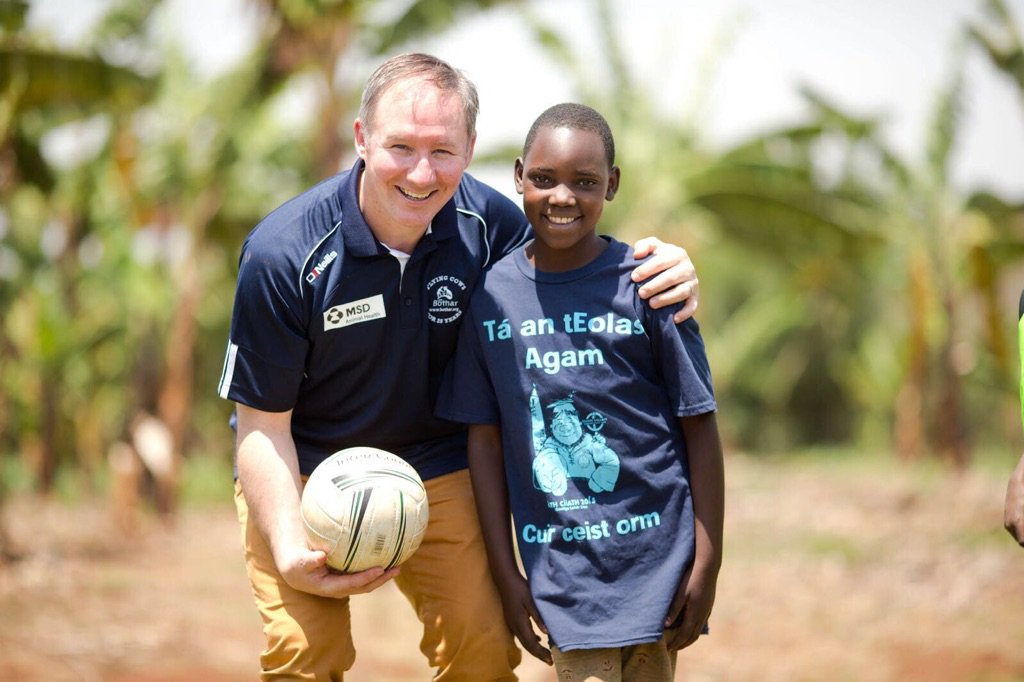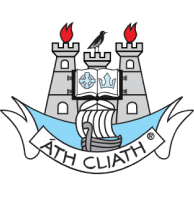Dublin football manager, Jim Gavin, flew to Rwanda this week as part of a delivery of over 5,300 animals to families in Rwanda on behalf of the Bothar charity.
Jim transported 41 tonnes of Irish livestock on the Bothar Ark to give to Rwandans.
**Among the cargo was 37 in-calf heifers, three bulls for the Rwandan Government National Bovine Breeding Scheme, 260 pigs, 100 goats, 5,000 chicks.
**
**Below is Jim’s blog #jimsjourney
**
It's a long way from Clare to here
I try to make it my business every year to go to Co Clare – the home of my parents – at least once.
It’s always special going back there but on Monday evening as I exited the tunnel under the river Shannon, crossed the border into Co Clare and headed for Shannon Airport, I could not but help feel that this was different.
By the time you read this, we will have been on the ground in Rwanda for 24 hours or more
We landed at Kigali Airport with all of 5,300 animals - oblivious to the thunderstorm outside -remarkably calm after being flown at 37, 000 feet on their 11 hour flight from Ireland, interrupted by a one hour period for rest and refreshment at Cairo Airport in Egypt.
The Bóthar Ark carrying the animals is a very special 25th anniversary airlift of 37 in-calf heifers, three bulls for the Rwandan Government National Bovine Breeding Scheme, 260 pigs, 100 goats, and 5,000 chicks.Also on board was 5,000 doses of Bovine Semen for the Rwandan Breeding Programme run by Bóthar’s sister agency Heifer International.
The journey actually started another 24 hours earlier in Co Tipperary, at the mart in Roscrea, Co Tipperary.
I haven’t been at a mart since I was a child in West Clare and it brought back memories; mostly of the kindness and friendliness of farmers.
It’s a hugely nostalgic mission for the aid agency Bóthar, which set out lift a quarter of a century ago. But it was also nostalgic for me personally as I met famers from near Creagh - my Dad’s homeland - who have donated heifers to Bothar for 21 years, and Míchael Clancy, a vet, who was taught by my grand-mother Kathleen Vaughan and sat beside my mother in Moy national school.
It was also good to meet Seamus Maguire from MSD who were on hand after coming on board as sponsors last week when they heard about this great project.

I also met with Shane McAuliffe a farmer and Robinson 42 helicopter pilot, from Castleisland in Kerry, who had donated his pigs to Bóthar.I listened to schoolchildren from picturesque village of Kilcommon who fundraised for a heifer calf that was on the raised on the farm of Edward Carr, whose daughter was in the local school. I chatted about the football and hurling championships with farmers from Donegal, Carlow, Monaghan, Louth, Sligo, Limerick, Wexford, Kildare, Offaly, Westmeath, Cork, Kilkenny and Wicklow.But in call cases the conversations moved quickly to Bóthar and the trip ahead - to something much more important; their aspiration of giving hope and helping to save lives.
It was humbling, to say the least to meet them.Men and women in what is a very challenging year for farming, particularly dairying.Yet there they were, handing over in-calf heifers worth up to €1,800 perhaps.
The question did enter my head how many of us, in circumstances where we are barely making ends meet, would find it within ourselves to hand over something of that value.
Others gave goats, pigs and chicks; many, many more donated money to buy them.
All in the cargo is worth just short of €350,000; essentially a donation by the people of Ireland to what are among the poorest people of the world, and most of them having been affected by genocide.
During my military service career with Ógligh Na hEireann I spent time on the ground with the United Nations in Africa and I was always drawn to and impressed by the work of Irish charities. But what I like about Bóthar was transparency of their work and their simple concept of helping others to help themselves – giving a hand up; not a hand out. The gift of an income-and-food-producing animal is a masterstroke. It empowers the receiver to make good of themselves; to nurture an animal to produce milk and nutrition on their table, or calf their heifer, and with the money from the sale used typically to help educate their children, right up to third level.
So I wrote to Bóthar and offered my support. We met earlier this year and they were bold enough to ask if I would join them on their 25th anniversary trip. I was glad to ab asked to play a part, and I have to admit, not least because of the pilot in me, the thought of flying in an Airbus on a world-record, 41ton, 5,300 multi-species animals 10,000km across the world excited me.
More than anything it was because of what was at the end of the journey.
And I haven’t been disappointed.
Once we got the monumental cargo off the aircraft – and that was an exercise in logistics and team work that had to be seen to be believe – we moved to ‘The Showgrounds’ on the outskirts of Kigali where the cows, bulls and goats were taken to rest up and have some food and water.
And it was then I got the first real sense of just how valuable this cargo is.
When we arrived, local volunteers could be heard chopping up elephant grass for animals I’m assured will be treated like a new family member.
African dancers were on hand to set a heart-thumping tempo as the in-calf heifers trotted down the ramp to their temporary lodgings in their new homeland.
We were told that so important is the cow in Rwandan culture that the native dance is a celebration of their very existence!
Dignitaries were there in their dozens, right up to the Minister for Agriculture – who holds the most important brief in the nation given that the sector underpins the Rwandan economy.
The new arrivals gave an instant seal of approval, very calmly taking to their new surrounds, deservedly drinking back water from their troughs before tucking into their elephant grass with gusto.
As we left, they looked very assured in their pens, facing out onto rich green pastures of Rwanda that they will graze over the coming days before being moved to families.



:format(auto))
:format(auto))
:format(auto))
:format(auto))